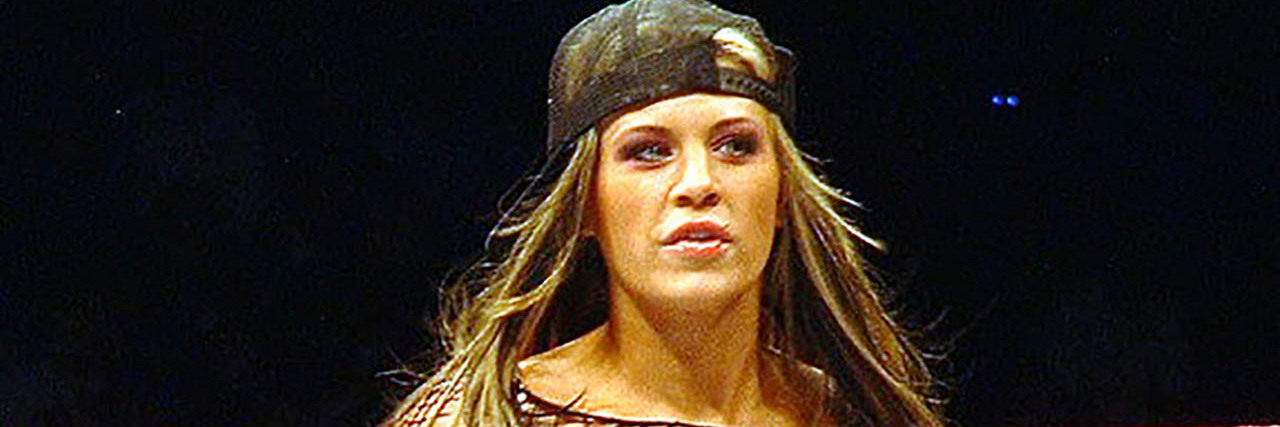Former WWE Diva Superstar Ashley Massaro Dies by Apparent Suicide at 39
Editor's Note
If you experience suicidal thoughts or have lost someone to suicide, the following post could be potentially triggering. You can contact the Crisis Text Line by texting “START” to 741741.
Former WWE Diva Superstar wrestler Ashley Massaro died at the age of 39 on May 16, according to People. While her cause of death has not been officially announced, multiple sources have said Massaro died by apparent suicide, according to TMZ.
Massaro is best known for her time as a professional wrestler as a WWE Diva Superstar from 2005 to 2008 after winning WWE’s “2005 Raw Riva Search.” She was also a contestant on the reality show “Survivor: China” in 2007. She began wrestling again with another company in 2017.
The WWE responded to Massaro’s death in a statement, writing:
We are saddened to learn of the tragic death of former WWE Superstar Ashley Massaro. She performed in WWE from 2005-2008 and was beloved by her fellow Superstars and fans around the world. WWE offers its condolences to Ashley’s family and friends.
We are saddened to learn of the tragic death of former WWE Superstar Ashley Massaro. WWE offers its condolences to Ashley’s family and friends. https://t.co/PqHSRbOGso
— WWE (@WWE) May 17, 2019
Prior to her death, the Boston Globe reports Massaro advocated for better health care policies within the WWE. She was involved in a 2016 lawsuit along with 59 other former WWE professional wrestlers that aimed to take the $1 billion dollar company to task for failing to protect them from head injuries that can lead to chronic traumatic encephalopathy (CTE), a degenerative brain disease that can only be diagnosed after someone has died.
WWE wrestler Chris Benoit, who killed his family before dying by suicide in 2007, was shown to have CTE in his autopsy. Since then wrestlers Axl Rotten, Balls Mahoney, Jimmy Snuka, Mr. Fuji and Ron Bass have shown signs of CTE after they have died. According to the Boston Globe, Massaro alleged she had experienced several concussions during her time in the ring, including one incident when she was unconscious for five minutes in the ring, and no follow-up care.
While the WWE did help provide Massaro with addiction treatment in 2010, she alleged she also struggled with depression, anxiety, memory loss, migraine and other injuries as a result of her time in the sport. She also alleged she was sexually assaulted while performing with the company during a military show in Kuwait without adequate follow-up. The wrestlers’ lawsuit was dismissed in 2018 and is now pending an appeal.
In a segment on “Last Week Tonight With John Oliver,” Oliver outlined how the WWE still doesn’t provide comprehensive health coverage for its performers. Superstars are classified as independent contractors rather than employees — despite the fact WWE Superstars must sign an exclusive contract.
As independent contractors, the $1 billion company isn’t obligated to provide benefits such as health coverage, despite the high rate of injuries and risk for addiction and mental health issues. Oliver also highlighted early deaths among athletes in the WWE are higher than among the professional football and hockey leagues.
Following the airing of Oliver’s segment, the WWE refuted many of the claims he made. It said in a statement:
Prior to airing, WWE responded to his producers, refuting every point in his one-sided presentation. John Oliver simply ignored the facts. The health and wellness of our performers is the single most important aspect of our business, and we have a comprehensive, longstanding Talent Wellness program. We invite John Oliver to attend WrestleMania this Sunday to learn more about our company.
Massaro had been open about living with addiction and depression following her career in the WWE in addition to her advocacy for better health care for professional wrestlers. Konstantine Kyros, a lawyer for Massaro, told the New York Post she had agreed to donate her brain to study the potential consequences of CTE, though this decision is still pending an autopsy.
Colleagues and fans mourned Massaro’s loss on social media.
In 2007 when I got called up from developmental, Ashley Massaro was one of the locker room who reached her hand out and pulled me up to make me feel like part of the team and instilled a family attitude in the locker room. That kindness is rare and should never leave our business
— Cody Rhodes (@CodyRhodes) May 17, 2019
Words cannot express my sadness for the Loss of @ashleymassaro. Ashley took me under her wing & was so sweet to Me. I have very fond memories, that I will treasure. Too young to be gone.
“What moves through us is a silence, a quiet sadness, a longing for one more day, one more pic.twitter.com/DDamfsbEdh
— Layla El (@mslayel) May 17, 2019
Darling @ashleymassaro11 my heart hurts so much with this news. I remember being off with an injury and watching this beautiful, charismatic, athletic girl crowned Diva Search winner…. https://t.co/V01FeTiqvM pic.twitter.com/3wHb7eQDr2
— Trish Stratus (@trishstratuscom) May 17, 2019
Rest peacefully #AshleyMassaro ???? https://t.co/B6KjA2VixE
— Trinity Fatu (@NaomiWWE) May 17, 2019
I am so terribly sad to hear of the passing of Ashley Massaro. She was always so kind to me and supportive. This is an incredible loss. ????
— Brandi Rhodes (@TheBrandiRhodes) May 17, 2019
So upsetting to hear of @ashleymassaro11 passing. She was always so bright and full of energy. Wishing strength and peace to her daughter and family during this horrific time for them.
— Amy Dumas (@AmyDumas) May 17, 2019
Absolutely heartbreaking. RIP Ashley Massaro. Godspeed.
— Frankie Kazarian (@FrankieKazarian) May 17, 2019
If this news is hard for you, know you are not alone — and there is help for people who feel suicidal. You can call the National Suicide Prevention Lifeline at 1-800-273-8255 or text “START” to 741-741. Head here for a list of crisis centers around the world.
Image via Wikimedia Commons/Terry Kelly

